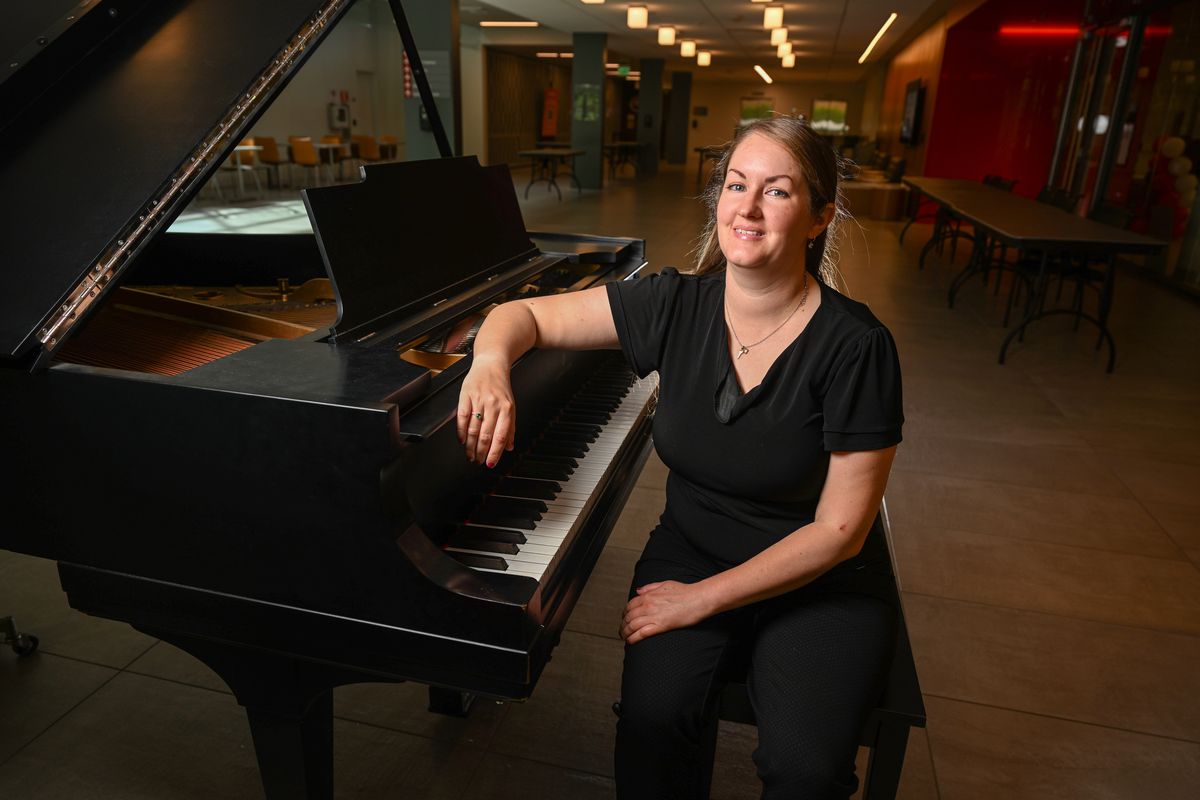Recent EWU grad Hilary Baird is a piano teacher opening doors to students who have developmental disabilities

Hilary Baird knows how difficult and rewarding it can be to learn an instrument as someone with a learning difference. Now a music teacher, the pianist hopes music can open doors for those with developmental disabilities.
“I understand firsthand how difficult it was for me to learn an instrument,” said Baird, who has autism. “But because I understand how hard it is, it makes it easier to teach.”
First taking piano lessons at 10, Baird had to put aside her passion as she struggled in school. It was not until her twenties she was diagnosed with autism and realized why she struggled with her academics. Through research she conducted at Eastern Washington University, Baird now believes that continuing her music education as a child would have improved her performance at school.
“With my research backed by neuroscience, I’m really hoping to help educate the general public that those with a delay in development actually have very, very profound giftedness,” she said. “Music can bring that out in them. It is possible for music lessons to help their memory and cognition in their academics of school, and build their attention span” she said.
Jessica Jarvis is a nonverbal adult with severe autism who began lessons with Baird five years ago. Since then Jarvis has become proud of herself through music, her mother said.
“When you have a cognitive disability as severe as my daughter does, there isn’t a whole lot she can do to feel accomplished. But now I think even she realized that it was quite the accomplishment that she could play the piano,” said Sandra VanDoren of her daughter.
Jarvis is 38 years old, but has the cognitive ability of someone who is 4, VanDoren added. Despite these roadblocks, music has given her a new way to communicate – even composing music herself.
“There was one piece Jessica wrote and she would play it over and over. Whatever Jessica would play, (Baird) would write it out on sheet music. And some of Jessica’s music has been performed by other people,” VanDoren said.
Baird wants the public to know those with developmental differences like Jarvis can still perform and write music at a competent level.
“Some people may unfortunately assume that because the person has a delay in development that they might not get that far with an instrument, or they might not be capable of reading sheet music, or they might not be capable of composing. And that is just not true,” Baird said.
To get them to that point Baird meets each student at their level. Rather than a rigid set of expectations each student can learn in a different way at their own pace. A common tactic she employs is to color-code each note to help students more easily read music.
When looking for piano lessons for her 8-year-old daughter, Jame Roberts was concerned a piano teacher might not understand how to adjust their lessons to teach piano to someone with dyslexia.
“I thought a more traditional teacher would expect things she couldn’t do as fast as some of the other kids. I was worried she was going to get discouraged and want to quit,” Roberts said. “But it felt like Hilary just understood how her mind works differently.”
VanDoren echoed this sentiment. Even though Baird and her daughter are on very different ends of the autism spectrum, she believes the piano teacher has insight into Jarvis by “living in the same world.”
Baird was recently accepted into the prestigious Berklee College of Music in Boston, where she hopes to continue her research and teaching and pursue a master’s degree. The music education program there is one of a few in the country that has an “emphasis on special education and autism studies,” she said.
“The program is highly competitive due to the school’s national reputation and how exclusive the area of study is,” says Jonathan Middleton, a professor of theory and composition in EWU’s Department of Fine and Performing Arts, who has worked closely with Baird. “Admission to the program is a life changing experience for her and the future students she will serve.”
While trying to make money to attend the program, Baird has deferred her studies for a year.
Baird dreamed of being a piano teacher but it seemed out-of-reach for a long time.
“I worried I couldn’t do it because I had to stop my lessons at a young age,” she said. “I always wanted to be a piano teacher ever since I was a kid. Even before I took piano lessons, I wanted to be a piano teacher.”